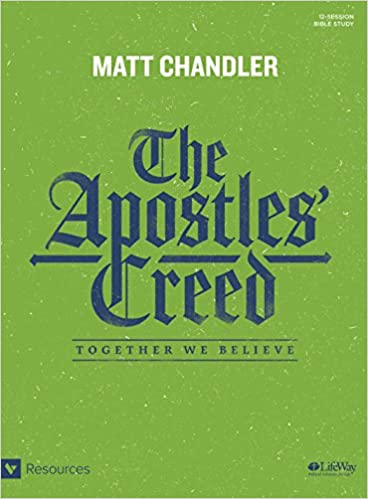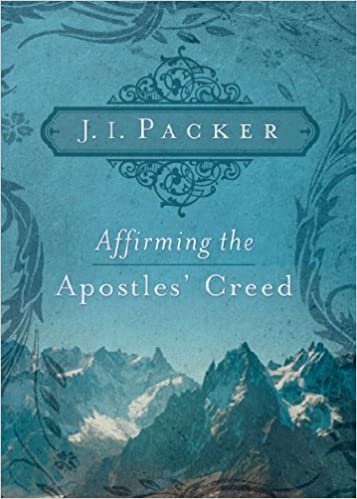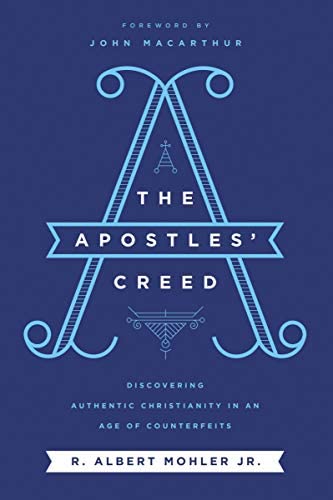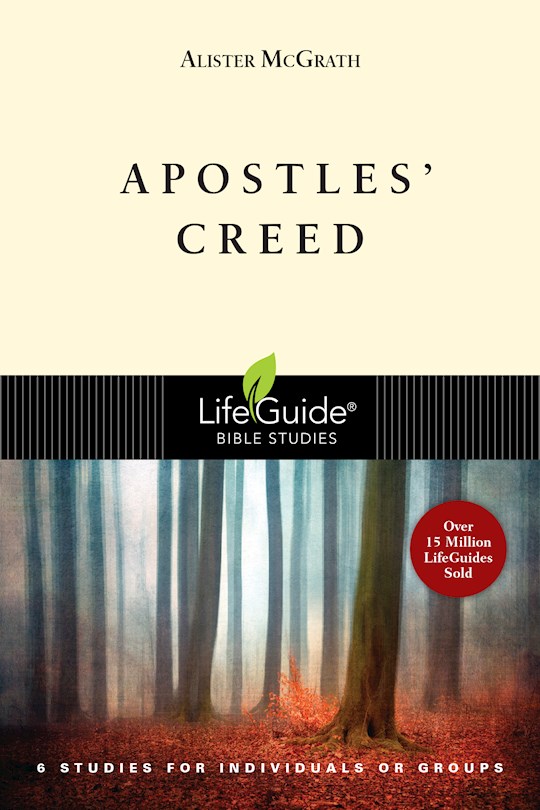Click here to return to Blog Post Intro
The Apostles’ Creed: A Guide to the Ancient Catechism by Ben Myers

One of the great themes of the Bible is the unity of the human family. In Genesis, the fall brings about a tragic disordering of relationships. God’s creation is divided.
The Pentecost story shows the undoing of the fall through the creation of the Christian community. When the Spirit descends on the frightened company of Jesus’ followers, they all begin to speak in different languages. The multicultural crowd is astonished to find that each one’s language is being spoken by a band of Galileans. They ask, “How is it that we hear, each of us, in our own native language?” (Acts 2:1-13).
There is now a new human society in which all the old divisions are torn down. That is what happens when the Spirit is present. The Spirit fulfills the Creator’s original plan by bringing forth a universal community whose boundaries are as wide as the world.
The Spirit fuses unity and diversity by bringing “many gifts” together in “one body” (1 Corinthians 12:12-31). We become more truly ourselves as the Spirit broods over us and as our lives are knit together with other lives and stories.
Basil, a great fourth-century Cappadocian pastor and social reformer, explained it like this: the Spirit “is like a sunbeam whose grace is present to the one who enjoys it as if it were present to that one alone, yet it illuminates land and sea and is mixed with the air.” There is nothing more personal, and more universal, than the Holy Spirit.
The Apostles’ Creed: Together We Believe by Matt Chandler

The Father and the Son sent the Holy Spirit to the church in one of the most climatic events in salvation history—Pentecost. The Spirit was poured out on the church as a gift from the Father and the Son. The triune God created a new Spirit-born people—the church—characterized by the indwelling presence of the Holy Spirit.
The people of God are prone to forget the faithfulness of God yesterday and simply complain about what they don’t have today.
The Bible testifies that no one can know Christ except by the Holy Spirit. Therefore, the Spirit is known as the One who gives life (John 6:63). The Holy Spirit informs and stirs up adoration that drives our obedience.
Sometimes people speak of the Holy Spirit in impersonal terms. In contrast, Jesus referred to the Spirit as He, Helper, and Guide. The Spirit is never an it.
When the Father gives the Holy Spirit to you, you also receive all of Christ’s benefits of sonship. Therefore, all of salvation—from beginning to end—is a gift from God the Father, accomplished through God the Son, and given through God the Holy Spirit.
While the Holy Spirit works in accordance with the Father and the Son to bring about salvation in the lives of believers, the Spirit also enables us to live as Christians by His power.
It’s vital for believers to be able to discern spiritual truth from lies. One job of the Holy Spirit is to help us read and understand the Bible. This doctrine is called illumination. Illumination means God must enlighten the human mind in order for us to understand the things of God. The Spirit renews our minds and restores our senses by revealing spiritual truth to us.
In Galatians 5, Paul points out that all virtues are born of the Holy Spirit, and all vice is born of the flesh.
The Holy Spirit is now the presence of Christ everywhere, available to all believers at any given moment. Now, with the Holy Spirit, humans are turned into proper vessels for cosmic renewal.
Affirming the Apostles’ Creed by J. I. Packer


The Spirit of Christ is divine (“Holy,” says this). He is an active Person, the Executive of the Godhead.The Old Testament mentions the Spirit as:
- Connected with creation, both divine (Genesis 1:2) and human (Exodus 31:1-6)
- The inspiring of God’s spokesmen (Isaiah 61:1)
- The equipping and enabling of God’s servants (Judges 13:25; 14:19; Isaiah 11:2)
- Evoking of godliness in individuals and in the community (Psalm 51:11; Zechariah 12:10)
All this gains deeper meaning in the New Testament where the Spirit is shown to be a personal agent distinct from the Father and the Son and is spoken of as “the Spirit of Christ” (Romans 8:9; 1 Peter 1:11).
The Spirit’s purpose is identical with the Father’s—namely, to see glory and praise come to the Son. Accordingly—
- The Spirit serviced the Son throughout his earthly life from the moment when, as the Creed says, he was “conceived by the Holy Spirit” (Matthew 1:20)
- The Spirit now acts as Jesus’ agent—“another Helper” (John 14:16). The Spirit shows Jesus to us through the gospel, unites us to him by faith, and indwells us to change us “into [his] image” by causing “the fruit of the Spirit” to grow in us.
- The Spirit gives to every Christian one or more gifts (i.e., capacities to express Christ in serving God and man), so that every-member ministry in the church, which is Christ’s body, may become a reality (1 Corinthians 12:4-7; Ephesians 4:11-16).
As Packer wrote, “When I say, as a Christian, ‘I believe in the Holy Spirit,’ I believe personal fellowship, across space and time, with the living Christ of the New Testament to be a reality. In addition, I am open to being led by the Spirit, who now indwells me, into Christian knowledge, obedience, and service; and I bless him as the author of my assurance that I am a son and heir of God. Truly, it is a glorious thing to believe in the Holy Spirit!”
The Apostles’ Creed: Discovering Authentic Christianity in an Age of Counterfeits by R. Albert Mohler, Jr.

The Trinity is an unfathomable doctrine. In the Great Commission, Jesus told his disciples:

To know the one true God is to know Him as Father, Son, and Holy Spirit. Where true Christianity is found, the affirmation of the Trinity is found.
Many Christians fall shamelessly short in understanding the Holy Spirit, or the third person of the Trinity. In some evangelical circles, the Holy Spirit has faded into the background of our theological interests, leaving us with an anemic view of the Spirit, and subsequently, a deficient relationship with the third member of the Trinity.
Jesus told his disciples that to have the Spirit is actually better than to have the physical Christ in our presence.

Jesus described the ministry of the Spirit in John chapters 14-16:
- The Spirit who Abides: The fear of being left behind without Jesus gnawed at the hearts of the disciples. Peter, as he often did, put words to their concerns when he exclaimed, “Lord, to whom shall we go?” (John 6:68). Jesus promised not to leave them as orphans. Rather, Jesus promised an unfathomable unity and inexplicable bond that will exist between the people of God and the Holy Spirit.
- The Spirit who Teaches: When Jesus taught, he taught as one with authority (Matthew 7:29). Jesus promised that the Spirit of God would come upon all those who believe in Christ and teach us all things and bring to our minds the inspired Word of God. Peter affirmed that the Bible is the gift of the Holy Spirit when he wrote, “For no prophecy was ever produced by the will of man, but men spoke from God as they were carried along by the Holy Spirit” (2 Peter 1:21).
- The Spirit who Testifies: Jesus promised, “When the Helper comes, whom I will send to you from the Father, the Spirit of truth, who proceeds from the Father, he will bear witness about me” (John 15:26-27). Each member of the Trinity is equal in divinity and power, very God of very God. The Holy Spirit exalts the Son and testifies to His accomplished work at Calvary. Where you find the Spirit of God present, you do not find so much testimony about the Holy Spirit as you find a testimony about Christ.
- The Spirit who Bears Truth: Jesus said, “When the Spirit of truth comes, he will guide you into all the truth, for he will not speak on his own authority, but whatever he hears, he will speak, and he will declare to you the things that are to come. He will glorify me, for he will take what is mine and declare it to you” (John 16:13-14). Christians must take comfort from the Spirit of truth that dwells in them. We live in a post-truth age, an age that all but denies the existence of any absolute truth. The Holy Spirit calls us to the truth of God and His will for our lives. As he does this, Christians must remember that the truth will set you free (John 8:32).
Walk by the Spirit. Know him and meet with him daily in the Word and through the power of your local church and fellowship. Depend om the Spirit to bear his fruit in your life. Galatians 5:16 comes as a promise of God: “If you walk by the Spirit, you will not gratify the desires of the flesh. If you sow to the Spirit, you will reap from the Spirit eternal life.”
Apostles’ Creed by Alister McGrath

The ascended Christ lives in believers through the Holy Spirit. We must not allow the limitations of our reason and imagination to impose restrictions on what the risen and exalted Christ can do.
Here are some high points of the Christian understanding of the work of the Holy Spirit:
- The Holy Spirit convicts us of our sin. Jesus promised his disciples the continued presence and power of the Spirit after He had left them. The Spirit would convict the world of its guilt and sin, and convince them of the reality of judgment (John 16:7-11).
- The Holy Spirit is a pledge of our salvation (2 Corinthians 1:22). The basic meaning of pledge is “down payment” or “token of commitment.” God places his Spirit within our hearts as a down payment: it demonstrates that we are his and promises that there is more to come.
- The Holy Spirit is our Comforter. As Jesus prepared to leave His disciples, He promised to send them a Comforter (John 14:25-26). The Greek word parakletos is usually translated as “comforter,” “advocate” or “counselor.” The Greek word for comfort can also bear the meaning “urge on” or “encourage to do greater things.” The Spirit prods us, encouraging and empowering us to do things we otherwise would not and could not do.
Concerning Spiritual Gifts (1 Corinthians 12:1-11)
Now about the gifts of the Spirit, brothers and sisters, I do not want you to be uninformed. You know that when you were pagans, somehow or other you were influenced and led astray to mute idols. Therefore, I want you to know that no one who is speaking by the Spirit of God says, “Jesus be cursed,” and no one can say, “Jesus is Lord,” except by the Holy Spirit.
There are different kinds of gifts, but the same Spirit distributes them. There are different kinds of service, but the same Lord. There are different kinds of working, but in all of them and in everyone it is the same God at work.
Now to each one the manifestation of the Spirit is given for the common good. To one there is given through the Spirit a message of wisdom, to another a message of knowledge by means of the same Spirit, to another faith by the same Spirit, to another gifts of healing by that one Spirit, to another miraculous powers, to another prophecy, to another distinguishing between spirits, to another speaking in different kinds of tongues, and to still another the interpretation of tongues. All these are the work of one and the same Spirit, and he distributes them to each one, just as he determines.
- How do you see the Holy Spirit active in your church fellowship?
- How do you see the Holy Spirit active in your own life?
May these words bring encouragement, comfort, and peace, as you shoot for the stars!
